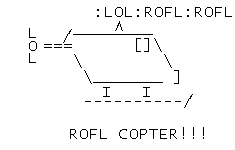Howdy, Stranger!
Categories
- 3.7K All Categories
- 3K The Midnight Age
- 757 Announce posts
- 125 Newbies
- 6 Class Guides
- 805 Harpy's Head Tavern
- 57 Echo Canyon
- 310 Self-Affirmations
- 163 Town Crier
- 135 The Exchange
- 167 Sparring Grounds
- Combat Guides
- 30 Combat Logs
- 188 Idea Box
- 9 Classleads
- 581 Roleplay Logs
- 107 Aetolia Development
- 5 The Void
- 744 Miscellaneous
- 9 Announcements
- 417 OOC Chat
- 217 Tech Talk
- 47 Scripts
Looking for more active discussion? Join our Discord at https://discord.gg/x2s7fY6
Personality Tests!
So I had to take some personality tests for a class. Thought it'd be cool to see what other Aetolians got!
Personality Test:
http://www.humanmetrics.com/cgi-win/JTypes2.asp
I turned out to be an ENFP
You have strong preference of Extraversion over Introversion (89%)
You have moderate preference of Intuition over Sensing (38%)
You have distinctive preference of Feeling over Thinking (62%)
You have distinctive preference of Perceiving over Judging (67%)
ENFPs are both "idea"-people and "people"-people, who see everyone and everything as part of a cosmic whole. They want to both help and to be liked and admired by other people, on both an individual and a humanitarian level. This is rarely a problem for the ENFP, as they are outgoing and warm, and genuinely like people. Some ENFPs have a great deal of zany charm, which can ingratiate them to more stodgy types in spite of their unconventionality.
ENFPs often have strong, if sometimes surprising, values and viewpoints. They tend to try to use their social skills and contacts to persuade others gently (though enthusiastically) of the rightness of these views; this sometimes results in the ENFP neglecting their nearest and dearest while caught up their efforts to change the world.
ENFPs can be the warmest, kindest, and most sympathetic of mates; affectionate, demonstrative, and spontaneous. Many in relationships with an ENFP literally say, "They light up my life." But there is usually a trade-off: the partner must be willing to deal with the practical and financial aspects of the relationship, and the ENFP must be allowed the freedom to follow their latest path, whatever that entails.
Personality Test:
http://www.humanmetrics.com/cgi-win/JTypes2.asp
I turned out to be an ENFP
You have strong preference of Extraversion over Introversion (89%)
You have moderate preference of Intuition over Sensing (38%)
You have distinctive preference of Feeling over Thinking (62%)
You have distinctive preference of Perceiving over Judging (67%)
ENFPs are both "idea"-people and "people"-people, who see everyone and everything as part of a cosmic whole. They want to both help and to be liked and admired by other people, on both an individual and a humanitarian level. This is rarely a problem for the ENFP, as they are outgoing and warm, and genuinely like people. Some ENFPs have a great deal of zany charm, which can ingratiate them to more stodgy types in spite of their unconventionality.
ENFPs often have strong, if sometimes surprising, values and viewpoints. They tend to try to use their social skills and contacts to persuade others gently (though enthusiastically) of the rightness of these views; this sometimes results in the ENFP neglecting their nearest and dearest while caught up their efforts to change the world.
ENFPs can be the warmest, kindest, and most sympathetic of mates; affectionate, demonstrative, and spontaneous. Many in relationships with an ENFP literally say, "They light up my life." But there is usually a trade-off: the partner must be willing to deal with the practical and financial aspects of the relationship, and the ENFP must be allowed the freedom to follow their latest path, whatever that entails.

1


Comments
Nothing is going to get better. It's not.”
― Dr. Seuss, The Lorax
Nothing is going to get better. It's not.”
― Dr. Seuss, The Lorax
INFJ for me.
It suggests I should become a writer. Ha.
http://keirsey.com/4temps/mastermind.asp
"NTJs apply (often ruthlessly) the criterion "Does it work?" to everything from their own research efforts to the prevailing social norms. This in turn produces an unusual independence of mind, freeing the INTJ from the constraints of authority, convention, or sentiment for its own sake ... INTJs are known as the "Systems Builders" of the types, perhaps in part because they possess the unusual trait of combining imagination and reliability. Whatever system an INTJ happens to be working on is for them the equivalent of a moral cause to an INFJ; both perfectionism and disregard for authority come into play. Personal relationships, particularly romantic ones, can be the INTJ's Achilles heel ... This happens in part because many INTJs do not readily grasp the social rituals ... Perhaps the most fundamental problem, however, is that INTJs really want people to make sense." —Marina Margaret Heiss
ENFJs are the benevolent 'pedagogues' of humanity. They have tremendous charisma by which many are drawn into their nurturant tutelage and/or grand schemes. Many ENFJs have tremendous power to manipulate others with their phenomenal interpersonal skills and unique salesmanship. But it's usually not meant as manipulation -- ENFJs generally believe in their dreams, and see themselves as helpers and enablers, which they usually are.
ENFJs are global learners. They see the big picture. The ENFJs focus is expansive. Some can juggle an amazing number of responsibilities or projects simultaneously. Many ENFJs have tremendous entrepreneurial ability.
ENFJs are, by definition, Js, with whom we associate organization and decisiveness. But they don't resemble the SJs or even the NTJs in organization of the environment nor occasional recalcitrance. ENFJs are organized in the arena of interpersonal affairs. Their offices may or may not be cluttered, but their conclusions (reached through feelings) about people and motives are drawn much more quickly and are more resilient than those of their NFP counterparts.
ENFJs know and appreciate people. Like most NFs, (and Feelers in general), they are apt to neglect themselves and their own needs for the needs of others. They have thinner psychological boundaries than most, and are at risk for being hurt or even abused by less sensitive people. ENFJs often take on more of the burdens of others than they can bear.
INFP
INTPs are pensive, analytical folks. They may venture so deeply into thought as to seem detached, and often actually are oblivious to the world around them. Precise about their descriptions, INTPs will often correct others (or be sorely tempted to) if the shade of meaning is a bit off. While annoying to the less concise, this fine discrimination ability gives INTPs so inclined a natural advantage as, for example, grammarians and linguists. INTPs are relatively easy-going and amenable to almost anything until their principles are violated, about which they may become outspoken and inflexible. They prefer to return, however, to a reserved albeit benign ambiance, not wishing to make spectacles of themselves. A major concern for INTPs is the haunting sense of impending failure. They spend considerable time second-guessing themselves. The open-endedness (from Perceiving) conjoined with the need for competence (NT) is expressed in a sense that one's conclusion may well be met by an equally plausible alternative solution, and that, after all, one may very well have overlooked some critical bit of data. An INTP arguing a point may very well be trying to convince himself as much as his opposition. In this way INTPs are markedly different from INTJs, who are much more confident in their competence and willing to act on their convictions.
INTPs and Logic -- One of the tipoffs that a person is an INTP is her obsession with logical correctness. Errors are not often due to poor logic -- apparent faux pas in reasoning are usually a result of overlooking details or of incorrect context.
Filled out for myself;
INTJ Rational - Mastermind
Then I filled it out while thinking like Ferrik;
Edit: Herpderp! Especially because of the first line in the article (and the first line of the last paragraph hah) about the performer
- You have marginal or no preference of Extraversion over Introversion (1%)
- You have moderate preference of Intuition over Sensing (38%)
- You have moderate preference of Thinking over Feeling (25%)
- You have slight preference of Perceiving over Judging (11%)
About right I'd think.Moderate preference of Introversion over Extraversion (33%)
Slight preference of Sensing over Intuition (12%)
Moderate preference of Feeling over Thinking (50%)
Introvert(33%) Sensing(44%) Feeling(50%) Judging(44%)
Is this test supposed to scare the wits out of you?! Reading into more of it, it's creeping me out a bit, I will admit.
A lot of those questions were really vague, or my answer would have been "Depends on the situation" or "Sometimes yes, sometimes no". I like more comprehensive versions of the test that have clearer questions with middle-ground options for responses.